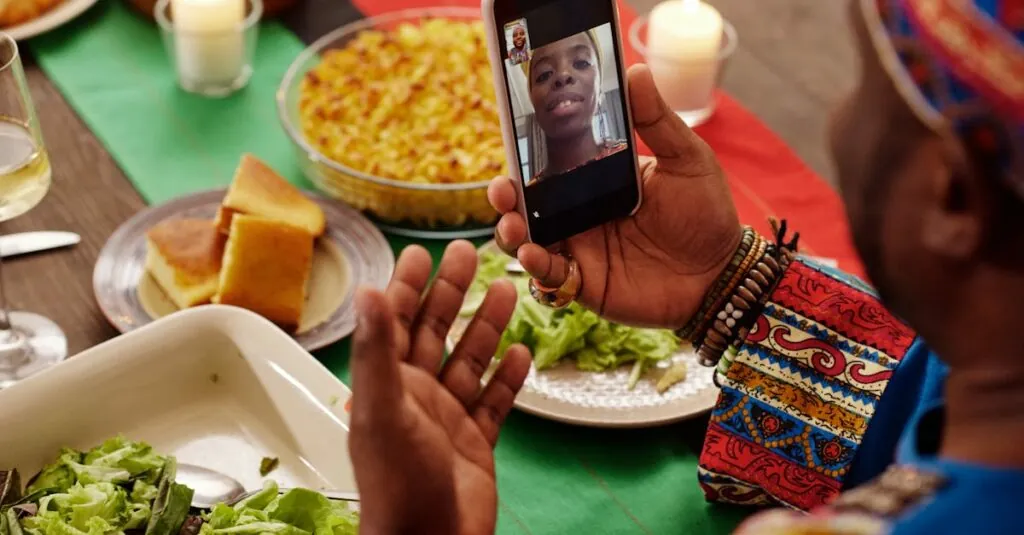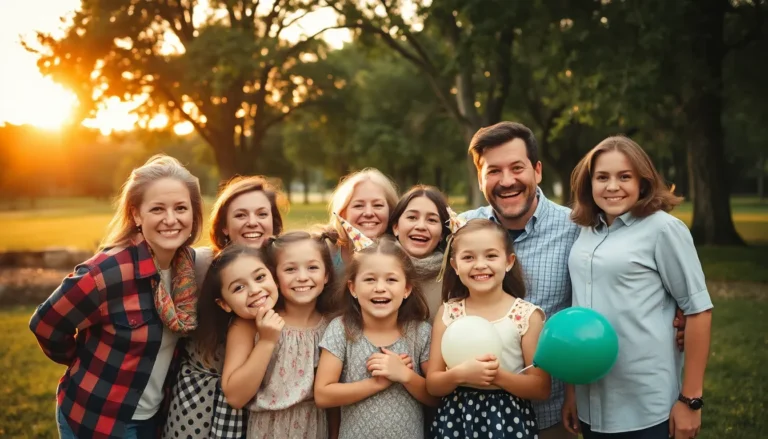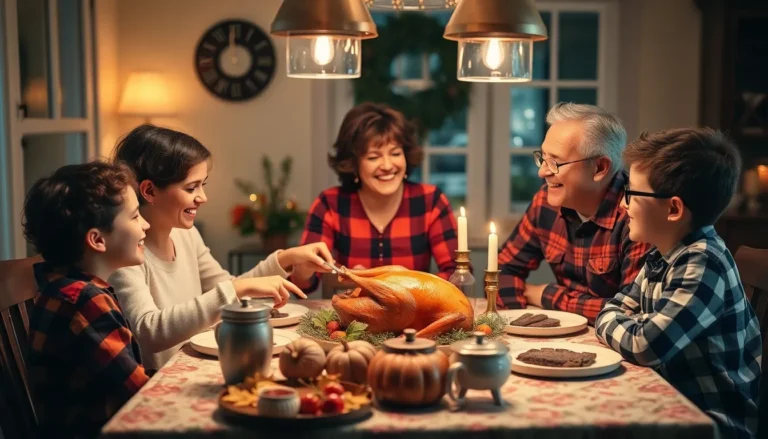Table of Contents
ToggleFamily holiday traditions are like that secret sauce that makes every gathering memorable. Whether it’s the annual cookie bake-off that turns into a flour fight or the epic game of charades that reveals hidden talents (or lack thereof), these quirky rituals bring laughter and love to the table. They create bonds that last a lifetime, transforming ordinary moments into cherished memories.
The Importance Of Family Holiday Traditions
Family holiday traditions serve as vital cornerstones for familial bonds. They provide opportunities for connection that transcend daily routines. Engaging in shared activities fosters a sense of belonging among family members. Together, families create and preserve unique memories that last a lifetime.
Participating in traditions often leads to strengthened relationships. Each cookie bake-off or game of charades cultivates laughter and joy while building trust and understanding. Bonds deepen as families navigate rituals, reinforcing shared values and beliefs. These traditions become a framework for teaching younger generations about appreciation and unity.
In addition, these rituals promote a sense of stability during changing times. Family traditions offer predictable structures, helping to ease transitions during holidays or life events. Holidays marked by traditions make gatherings feel special and anticipated. Familiar customs can bring comfort in an ever-evolving world, grounding families in their heritage.
Sharing stories connected to holiday customs enhances communication. Conversations during these traditions share histories and legacies that might otherwise remain untold. Encouraging storytelling sparks interest and curiosity among younger family members.
Family holiday traditions also enrich the cultural fabric. They celebrate diversity and encourage an environment of inclusion. By embracing different customs and practices, families cultivate an appreciation for various cultures. Engaging in traditions not only unites families but also broadens perspectives within them.
Popular Family Holiday Traditions
Family holiday traditions encompass various practices that unite loved ones during special times. These well-loved rituals create lasting memories and strengthen familial bonds.
Celebrating Christmas
Christmas often features tree decorating, where families come together to hang ornaments. Many engage in gift exchanges, adding excitement to the day. Traditional meals, such as roast turkey or ham, are staples at festive tables. Caroling can enliven the neighborhood, fostering community spirit. Many families also attend church services, connecting spiritual beliefs with the holiday. Lastly, some enjoy movie marathons, watching classic films like “It’s a Wonderful Life” or “Home Alone.”
Thanksgiving Traditions
Thanksgiving revolves around gathering around a table filled with turkey, stuffing, and cranberry sauce. Many families share what they are thankful for, deepening connections. Football games often draw attention after the meal, keeping excitement high. Some families opt for volunteer opportunities, giving back to the community. Cooking family recipes can spark nostalgia, reminding everyone of shared history. Additionally, many create unique activities, such as gratitude jars, to express appreciation throughout the year.
New Year’s Celebrations
New Year’s celebrations unite families with various traditions. Many host or attend parties featuring countdowns to midnight. Some engage in fireworks or sparklers, illuminating the night. A common practice includes making resolutions, promoting personal growth for the year ahead. Many families enjoy special foods, such as black-eyed peas or lentils, symbolizing prosperity. Additionally, some participate in cultural customs like first-footing, welcoming good fortune into the new year.
Unique Family Holiday Traditions Around The World
Family holiday traditions vary widely across cultures, reflecting unique values and heritage. These customs shape gatherings, fostering connections among relatives globally.
Cultural Influences
Different cultures shape how families celebrate holidays. In Mexico, families celebrate Día de los Muertos by honoring deceased loved ones with altars and offerings. In Italy, the Feast of the Seven Fishes brings families together for a traditional Christmas Eve dinner. Japanese families partake in unique New Year celebrations with rituals like the preparation of osechi ryori, a meal packed with symbolic foods. Each tradition serves as an expression of cultural identity, intertwining family bonds with shared heritage.
Regional Variations
Regional practices introduce distinct flavors to holiday celebrations. The southern United States includes gumbo and pecan pie during festive gatherings. Families in Sweden enjoy a smorgasbord featuring meatballs and herring on Christmas. In India, Diwali celebrations often showcase fireworks and sweet treats, strengthening connections among relatives. These variations not only enrich the holiday experience but also reflect the diverse fabric of family traditions worldwide.
Creating New Family Holiday Traditions
Creating new family holiday traditions adds excitement and strengthens connections. Families can foster creativity and engagement through these activities.
Involving Children
Engaging children in the creation of traditions enhances their investment and enthusiasm. Activities like crafting homemade decorations or baking special treats allow children to express creativity. They gain valuable skills while feeling included. Planning family game nights or storytelling sessions inspires excitement for each holiday. Each child might suggest their favorite activities, encouraging a sense of ownership in the traditions. As these traditions evolve, children learn the importance of family bonding and shared experiences.
Documenting Memories
Capturing memories from holiday traditions creates lasting reminders of special moments. Families can take photos or start a tradition journal to document activities, recipes, and stories. This way, memories become tangible artifacts families can revisit each year. Sharing these documented memories promotes conversation and reflection, helping family members connect over their shared history. Each recollection adds depth to the family narrative. As these records grow, they provide a legacy for future generations, ensuring that traditions thrive and continue to inspire.
Family holiday traditions are more than just rituals; they’re the threads that weave families together. By embracing these practices, families not only create joyful memories but also nurture a sense of belonging that lasts a lifetime.
As they gather around the table or engage in shared activities, the bonds between family members strengthen, fostering love and understanding. These traditions provide stability and continuity, especially during times of change, making each holiday feel special and anticipated.
Incorporating new traditions keeps the spirit alive and ensures that every generation feels included. Ultimately, the richness of family holiday traditions lies in their ability to connect hearts and minds, celebrating both heritage and the joy of togetherness.







